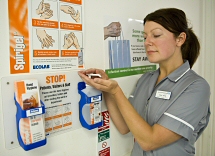Outpatients
Protecting you from infection
Protecting you from Infection
The Royal United Hospitals NHS Foundation Trust is committed to the prevention and control of infection and to providing care which is in line with the Care Quality Commission Regulation 12: Safe Care and Treatment.
The Trust is compliant with the Health and Social Care Act 2008, Code of Practice on the prevention and control of infections and related guidance (also known as the Hygiene Code). The code outlines the requirements for providers to assess the risk of, prevent, detect and control the spread of infections, including those that are health care associated. Compliance against the code is reviewed regularly through the Infection Prevention and Control Committee.
Infection Prevention and Control Annual Report
Helping us to prevent infection
Please follow the hand-cleaning instructions on entering and leaving all areas.

If you observe staff that have not washed their hands or used the alcohol gel before examining you or undertaking a procedure, please politely remind them to do so. They will not be offended.
If you plan to visit the hospital and you have experienced diarrhoea and/or vomiting or you are feeling unwell please 'stay away'. Please seek advice for your specific problem before visiting the hospital.
Due to specific infections, ward areas may need to be closed to:
- Restrict the movement of people
- Isolate staff and patients affected
- Avoid taking infections home to other family members
Patient information leaflets:
Reducing the Risk of Infection
Norovirus: Frequently Asked Questions
Clostridiodes difficile (C. diff) Leaflet
Extended Spectrum Beta-Lactamase (ESBL)
Further information can be found at www.nhs.uk
Other useful information is available from:
- The infection control team
01225 825450
- Patients association
www.patients-association.org.uk
0845 6084455
- NHS.UK home page
- UK Health Security Agency
- Your medical team or general practitioner (GP)
'Clean Your Hands' campaign
The 'cleanyourhands' campaign is a national initiative aiming to improve hand hygiene compliance by all NHS staff, consequently reducing the level of health care associated infection.
The desired outcome is a sustained behavioural change, resulting in high compliance with hand hygiene as a normal feature of all aspects of health care.
Hand hygiene needs to be performed at the critical moment and place, and be seen and understood to be an integral part of care. The point of care is where three elements coincide at the same time in any given place:
- The patient
- The healthcare worker
- Care involving contact
The campaign is designed to educate and inform healthcare workers about why, when and how to clean their hands and support NHS trusts to take an organisational wide approach to improvement. It also provides information for patients about how they can encourage good hand hygiene by the people looking after them.
Infection Rates (external site)
Healthcare associated infection (HCAI) remains a major problem. Many of these infections are associated with the use of indwelling medical devices, but contaminated hands of healthcare providers are the commonest cause of transmission of infections to patients.
If only 15% of these infections were prevented by achievable improvements in clinical practice, HCAI would be avoided in 45,000 patients each year and £150 million worth of NHS resources saved.

